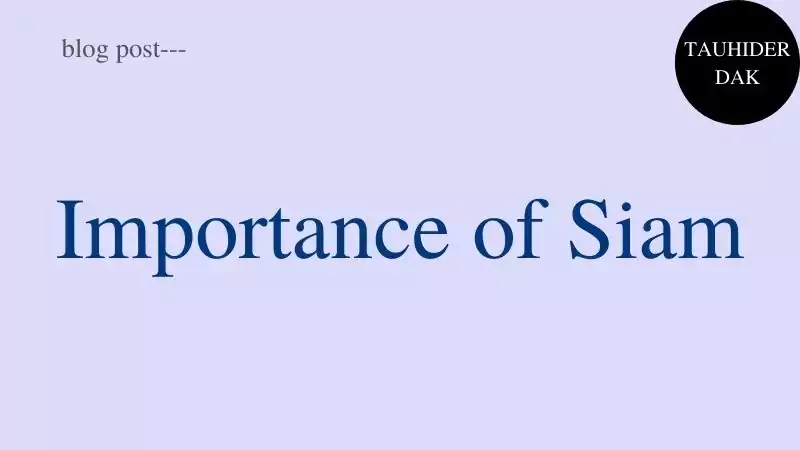Bismillahir Rahmanir Rahim
The importance of fasting in ramadan
Today we want to discuss the importance and virtues of fasting. Many virtues of fasting have been mentioned in the Qur’an and Hadith. I am discussing some issues with him.
One. Fasting is only for Allah
Allah Almighty has declared the relationship of fasting with Himself. In this way, he has given a special status to fasting from all acts of worship. As he said in a hadith in Qudsi: Every deed of man is for himself, but fasting is his exception, it is only for me, I will repay him.
Muslim: 270
From this hadith, we can understand how important fasting is to Allah in the midst of good deeds. So the Companions Abu Hurairah. When he said, O Messenger of Allah, instruct me to do a very good deed. The Prophet (peace and blessings of Allah be upon him) said: Observe fasting. Because there is no other period of its equivalence.
Nasai: 2534
Allah Almighty knows the reason for the dignity of fasting. However, what we see is that fasting is an act that does not make sense. A very secret matter between the servant and Allah. It can be seen who performed Salat Hajj, Zakat, and other acts of worship. Even if abandoned, it is understood. But in fasting, there is no thought of showing or listening. As a result, sincerity, sincerity, or devotion to Allah is pure and pure in the midst of fasting.
Two. Those who observe fasting are rewarded as without
Other acts of worship and good deeds are not rewarded without reward. Rather, instead of every good deed, the doer is rewarded ten times to seven hundred times.
The Prophet (peace and blessings of Allah be upon him) said that the reward for every good deed of a human being is increased ten to seven hundred times. Allah says (interpretation of the meaning): But fasting is different. Because fasting is only for me and I will repay it.
Muslim: 1551
How much will Allah, the Almighty Lord of the universe, give when He Himself rewards it? According to Imam. Explaining this hadith, he said that the fast which Allah will reward will not be measured, nor will it be weighed.
Three. Fasting protects from shields and evil tendencies
By fasting, the Prophet (peace and blessings of Allah be upon him) instructed us to stay away from evil instincts. He says:
O, young men! Let him who is able among you marry. Because marriage lowers the gaze and protects the place of shame. And he who cannot afford to marry should fast. Because it is his shield.
Muslim: 1400
Thus fasting abstains from all obscenities and nonsense. The Prophet (peace and blessings of Allah be upon him) said: Fasting is a shield. So whoever observes fasting among you, let him refrain from obscenity and noise. If anyone wants to quarrel or fight with him, let him know that I am fasting.
Muslim: 1551
Just as a fasting person controls his heart, so he protects his limbs from all obscene behaviors, quarrels, useless words, and deeds.
Four. Fasting is the shield of survival from hell
As mentioned in the hadith, fasting is a shield and a strong fortress against the fire of hell.
Ahmad: 9214 It has been
narrated in the hadiths of Bukhari and Muslim that if a person fasts in the way of Allah one day, Allah will remove Hell at a distance of one Kharif (seventy years) from him. Muslim: 279 The scholars have said that fasting in the way of Allah means: fasting only to gain the pleasure of Allah. In this way, Allah saves many fasting people from Hell. As it is mentioned in the hadith, during Iftar, Allah Almighty saves many people from Hell. And it is every night of Ramadan.
Baihaqi: 3605
Five. Fasting is the way to paradise
Abu Hurairah. He said, “I said to the Messenger of Allah, may Allah bless him and grant him peace, ‘O Messenger of Allah, instruct me to do something by which I may benefit.’ He said: You observe fasting. Because there is no other work equal to it.
Nasai: 2220
There is no deed comparable with fasting for gaining Allah’s pleasure and getting rid of Hell? Another example of God’s grace on those who observe fasting is that He has appointed a door to Paradise for those who observe fasting. No one but the fasting people will enter through that door.
The Prophet (peace and blessings of Allah be upon him) said: There is a door to Paradise. Whose name is Ryan? Only those who observe fasting on the Day of Resurrection will enter through that door. No one but them will be able to enter through that door. It will be announced on that day, where are the fasting people? Then they will stand to enter through the door. When they enter, the door will be locked. As a result, no one but them can enter.
Bukhari: 1898, Muslim: 1152
Six. The smell of the mouth of a fasting person is better in the sight of Allah than the smell of mesh
The Prophet (peace and blessings of Allaah be upon him) said: By the One in whose hand is the life of Muhammad (peace and blessings of Allaah be upon him), the smell of the mouth of the fasting person is dearer to Allaah than the smell of musk.
Bukhari: 1890, Muslim: 1151
Bad breath refers to the smell that comes from an empty stomach. The smell is not due to unclean teeth.
Seven. Fasting is the means of success in this world and in the hereafter
As stated in the hadith, are two joys for the observer of fasting: one is during Iftar and the other is during the meeting with his Lord.
Bukhari: 1890, Muslim: 1151
The joy during Iftar was due to the fact that he was able to complete the fast and was allowed to eat. It is a matter of real joy, which we all understand and feel. On the other hand, we will not be able to feel the joy of meeting Allah, but we will be able to do so on the Day of Resurrection. When all people will actually turn to God.
Eight. Fasting will recommend on the Day of Resurrection
Abdullah bin Amr. The Prophet (peace and blessings of Allah be upon him) said: Fasting and the Qur’an will recommend to people on the Day of Resurrection that fasting will say: O my Lord! I forbade him to eat and have sex during the day. So you accept my recommendation about him. The Qur’an will say, O Lord! I kept him awake at night, so you accept my recommendation about him. He said, then the recommendation of both will be accepted.
Ahmed: 628
Nine. Fasting is the cause of the forgiveness of sins and expiation of sins
Fasting is the sum of many good deeds. And good deeds erase sin. Allah, the Lord of the Worlds, says: Good deeds certainly forgive sins.
Surah Hud: 114
There are many hadiths that prove that good deeds are taken as expiation for six short sins. That is, Allah forgives sins due to good deeds. As it has been narrated in the Hadith that when a person commits a sin due to his family, neighbors, and wealth, then Salat, Siam, Sadaqah removes that sin.
Bukhari: 1895, Muslim: 6450
Ihtisab means: Fasting and Qiyam with sincerity and contentment, believing that there will be a reward from Allah. There is more in the hadith, 1895 8450 And Ramadan has more opportunities to forgive and atone for sins. It has been narrated in the hadith that whoever fasts with faith and piety in the month of Ramadan, his past sins will be forgiven.
Bukhari: 2014, Muslim: 1818
The five daily prayers, from one Friday to the next, and from one Ramadan to the next, are the expiation for the sins of the intervening period if the poets can be saved from sin.
Muslim: 574
Fasting removes six sins and repentance forgives the sins of the poets. Allaah says (interpretation of the meaning): “And if you refrain from doing the worst of what is forbidden to you, I will forgive you your minor sins.” And We will admit them to a place of honor.
In Surah An-Nisa: 31
It is proved by two verses and hadith that the forgiveness promised by Allah is subject to three conditions.
First: Ramadan fasting must be observed with faith. That is, faith in Allah and His Messenger and fasting is an obligatory act of worship. Believing in the rewards that Allah will give to the fasting person.
Second: Fasting must be observed with Ihtisab. Ihtisab means: to expect rewards and rewards from Allah, to observe fasting only to please Him, and not to consider fasting as a burden.
Third: Poets must stay away from sin. Poetic sins are those sins for which there is a provision of punishment in this world, a declaration of punishment in the Hereafter, or a proclamation of curse or wrath from Allah’s Messenger. For example, shirk, usury, embezzlement of orphans’ property, adultery, witchcraft, unjust killing, parental abuse, kinship relationship, false testimony, false accusation, drug use, fraud, false oath, slander, backbiting Or the next guilt practice, gossip, truth. Conceal etc. What kind of fasting can achieve all these virtues? Second: Fasting must be observed with Ihtisab. Ihtisab means: to expect rewards and rewards from Allah, to observe fasting only to please Him, and not to consider fasting as a burden.
all these virtues? All the virtues and rewards that have been discussed for so long will be gained only by the person who observes these conditions.
(1) Fasting should be performed only for Allah. Do not fast in order to show people or to gain praise or to improve people’s health.
(2) In performing fasting, one should follow the Sunnah of Allah’s Messenger (peace be upon him). All matters including sahri, iftar, Taraweeh have to be performed according to the Sunnah of the Prophet.
(3) It will not be enough to abstain from eating and drinking and sex. All kinds of illegal activities including lying, slander, obscenity, deception, quarrels should be refrained from. As the mouth refrains from food, so the eyes will refrain from unjust sight, the ears will refrain from listening to useless words and music, the feet will refrain from walking in unrighteous ways The great purpose of fasting is to protect oneself from all kinds of unjust and abusive behavior in the eyes of the Shari’ah. Therefore, fasting is a school of learning to acquire all good things and to refrain from unjust deeds and words.
The Prophet (peace and blessings of Allaah be upon him) said: There is no need for Allaah to abstain from food and drink if one does not renounce falsehoods and deeds and ignorance.
Bukhari 6056
The Prophet (peace and blessings of Allah be upon him) added: There are many fasting people whose only benefit from fasting is to be hungry and thirsty. Again, there are many praying people, whose prayers are received only at night.
Ahmed: 9091
Tags: the importance of fasting in Islam, the importance of fasting in Ramadan, the importance of fasting in the month of Ramadan, the importance of fasting sermon, the virtue of fasting Ramadan, the importance of Ramadan fasting,

